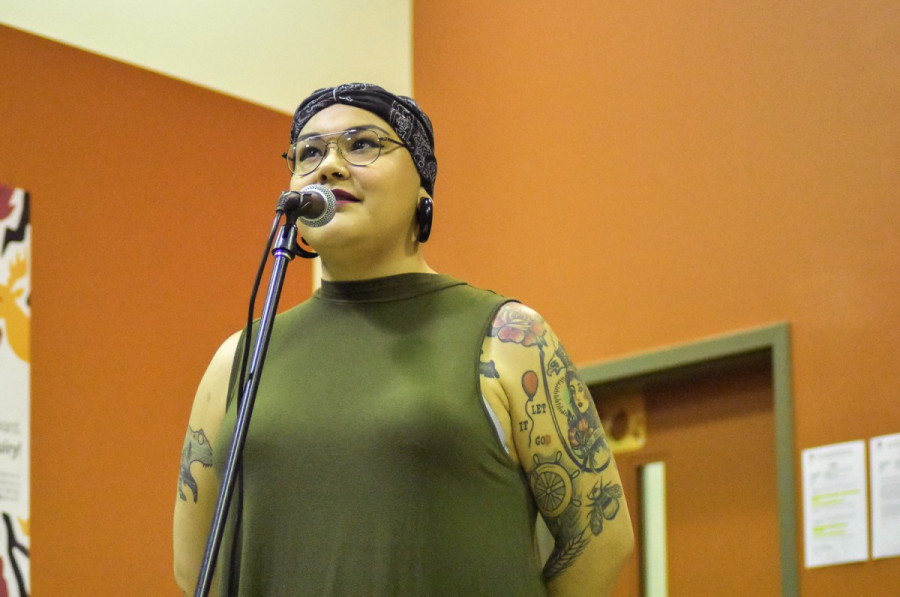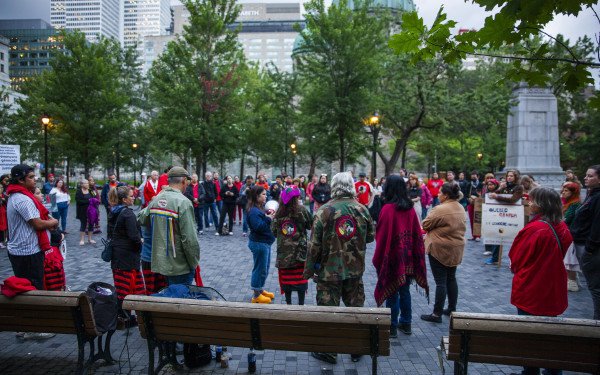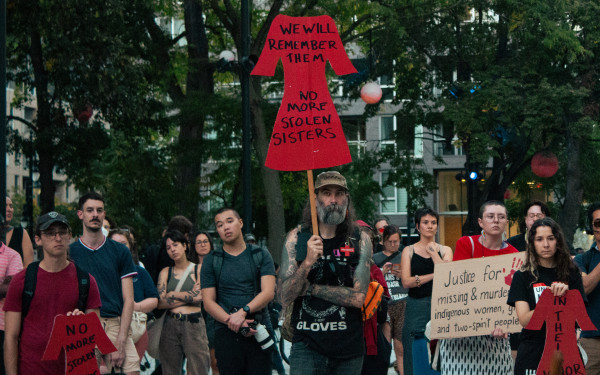Montreal Honours Missing and Murdered Women on Valentine’s Day
“We Don’t Deserve to Die and We Don’t Deserve to be Beaten”
“My heart breaks for our children, for our grandchildren, for those faces that we haven’t seen yet. Things need to change. Our people need to be safe and they’re not.”
Sedalia Kawennotas Fazio, a Mohawk elder from Kahnawake, began the annual Montreal Valentine’s Day commemoration of Missing and Murdered Women with a dose of reality on Wednesday. Things need to change.
For the 9th year in Montreal, Feb. 14 has become a day to commemorate missing and murdered women, particularly Indigenous women who are disproportionately targeted. People gathered at the Native Friendship Centre to hold missing people in their hearts and minds, and to share their experiences as part of their healing process.
Annual Valentine’s Day marches started in Vancouver, B.C. in 1991 as a response to the murder of a Coast Salish woman who received little attention from the media or the police. Eventually, the date became a national event.
The Montreal commemoration was organized by the Centre for Gender Advocacy, a Concordia University organization mandated to promote “gender equality and empowerment particularly as it relates to marginalized communities.”
Earlier this week, Fazio led the opening ceremony for the Montreal branch of the public inquiry into the mistreatment of Indigenous people in Quebec. When the commission asked her what they should do, she told them, “Tell our truths. Stop hiding what’s happening to our people. It’s been happening for 500 years, it needs to stop.”
Jessica Quijano, who works for the Native Women’s Shelter of Montreal, echoed those concerns when she told everyone to “do whatever you can to put pressure on your politicians.”
Nina Segalowitz, a child of the Sixties Scoop, addressed the men in the room. Before performing Inuit throat-singing with her daughter, she asked the men to stand up and repeat, “I will protect and I will not stand for violence.”
She then asked the women to stand up and repeat among other phrases, “I deserve to be safe.”
Throughout the evening, there were two moments of silence. One for missing and murdered women, and one for Colten Boushie, a 22-year-old Cree man from Saskatchewan who was killed in 2016. On Feb. 9, an all-white jury acquitted the man who shot him, Gerald Stanley, of manslaughter and second-degree murder charges. The devastation was felt throughout the room.
Read more about Colten Boushie
The second half of the event invited people from the audience to share a story, song, or poem of their experiences and to honour those who have been lost. These included songs dedicated to missing women, stories of murdered family members, memories of first vigils, and a mother holding one of her daughters, not yet old enough to walk, asking what she was going to tell her two daughters when they get older.
Being an Ally for MMIW
Many of the speakers mentioned the role of allies in the discrimination against Indigenous people. Fazio addressed the non-Indigenous people in attendance to “go out and start educating people. That’s the only way—it’s the only way we’re going to get somewhere.”
Killaq Enuaraq-Strauss, who will be speaking at the National Inquiry into Missing and Murdered Indigenous Women and Girls this weekend, told the white people in the audience that “ally-ship is about supporting us without taking away our voices.”
In response to the outcry of Boushie’s trial, Enuaraq-Strauss addressed problems within allyship.
“Stop trying to make it about you because then you’re taking away our space to mourn to find space for yourselves. You’re fighting our voices to make yours more heard and you’re making us defend ourselves when we were told that you wanted to work together,” said Enuaraq-Strauss.
The Centre for Gender Advocacy runs the Missing Justice campaign that raises awareness about violence and discrimination against Indigenous women. In an interview with The Link, Julie Michaud, outreach coordinator for the centre, said they try to take “cues” from Indigenous communities.
“We just need to remember to check in with Indigenous people and Indigenous organizations and ask them, ‘What’s useful for you to have allies do in the struggle for justice for Indigenous people?’” said Michaud.
Michaud noted that some people are concerned about getting involved because they feel like they don’t know enough, but that “nobody is an expert and we all learn together.”
Michaud said that if you’re not sure where to start, make sure that you are reading, and listening to what Indigenous people are writing, and saying.
She added that allies need to to talk to non-Indigenous friends and family about any wrong or racist ideas they might have, unlearn racism and help everyone around them because it “has to be a collective effort.”
In her closing remarks, Fazio emphasized that Indigenous people would like to live in peace in their country.
“We are not bad people. We don’t deserve to die and we don’t deserve to be beaten, and we don’t deserve to be called names when we’re out on the street,” said Fazio.




1_600_375_90_s_c1.jpg)
_600_375_s_c1.png)

